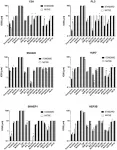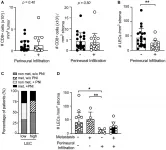(Press-News.org) High blood pressure, or hypertension, is the leading modifiable risk factor for cardiovascular diseases and premature death worldwide. And key to treating patients with conditions ranging from chest pain to stroke is understanding the intricacies of how the cells around arteries and other blood vessels work to control blood pressure. While the importance of metals like potassium and calcium in this process are known, a new discovery about a critical and underappreciated role of another metal - zinc - offers a potential new pathway for therapies to treat hypertension.
The study results were published recently in Nature Communications.
All the body's functions depend on arteries channeling oxygen-rich blood - energy - to where it's needed, and smooth muscle cells within these vessels direct how fast or slow the blood gets to each destination. As smooth muscles contract, they narrow the artery and increase the blood pressure, and as the muscle relaxes, the artery expands and blood pressure falls. If the blood pressure is too low the blood flow will not be enough to sustain a person's body with oxygen and nutrients. If the blood pressure is too high, the blood vessels risk being damaged or even ruptured.
"Fundamental discoveries going back more than 60 years have established that the levels of the calcium and potassium in the muscle surrounding blood vessels control how they expand and contract," say lead author Ashenafi Betrie, Ph.D., and senior authors Scott Ayton, Ph.D., and Christine Wright, Ph.D., of the Florey Institute of Neuroscience and Mental Health and The University of Melbourne in Australia.
Specifically, the researchers explain, potassium regulates calcium in the muscle, and calcium is known to be responsible for causing the narrowing of the arteries and veins that elevate blood pressure and restrict blood flow. Other cells that surround the blood vessel, including endothelial cells and sensory nerves, also regulate the calcium and potassium within the muscle of the artery, and are themselves regulated by the levels of these metals contained within them.
"Our discovery that zinc is also important was serendipitous because we'd been researching the brain, not blood pressure," says Betrie. "We were investigating the impact of zinc-based drugs on brain function in Alzheimer's disease when we noticed a pronounced and unexpected decrease in blood pressure in mouse models treated with the drugs."
In collaboration with researchers at the University of Vermont's Larner College of Medicine in the United States and TEDA International Cardiovascular Hospital in China, the investigators learned that coordinated action by zinc within sensory nerves, endothelial cells and the muscle of arteries triggers lower calcium levels in the muscle of the blood vessel. This makes the vessel relax, decreasing blood pressure and increasing blood flow. The scientists found that blood vessels in the brain and the heart were more sensitive to zinc than blood vessels in other areas of the body - an observation that warrants further research.
"Essentially, zinc has the opposite effect to calcium on blood flow and pressure," says Ayton. "Zinc is an important metal ion in biology and, given that calcium and potassium are famous for controlling blood flow and pressure, it's surprising that the role of zinc hasn't previously been appreciated."
Another surprising fact is that genes that control zinc levels within cells are known to be associated with cardiovascular diseases including hypertension, and hypertension is also a known side effect of zinc deficiency. This new research provides explanations for these previously known associations.
"While there are a range of existing drugs that are available to lower blood pressure, many people develop resistance to them," says Wright, who added that a number of cardiovascular diseases, including pulmonary hypertension, are poorly treated by currently available therapies. "New zinc-based blood pressure drugs would be a huge outcome for an accidental discovery, reminding us that in research, it isn't just about looking for something specific, but also about just looking."
INFORMATION:
(This press release has been adapted from an article featured by Pursuit and written by Ashenafi Betrie and Scott Ayton from the Florey Institute of Neuroscience and Mental Health, and Christine Wright of The University of Melbourne.)
The COVID-19 pandemic continues to disrupt and end lives around the world, and public health officials worldwide have recognized vaccines as the critical tools required for controlling the COVID-19 death toll and achieving a return to normal life. Several vaccines against COVID-19 are already in use, but the limited supplies of these vaccines and the possibility of safety and efficacy issues of the existing vaccines mean that it is important for scientists to develop more (and even better) vaccines. In fact, as of February 2021, 69 different vaccines are in various phases of clinical development.
One type of vaccine that could prove quite useful is the inactivated vaccine, which contains an inactivated form of the virus. The inactivated virus cannot harm the recipient, but ...
A new study published in the journal Diversity and Distributions predicts massive range declines of Africa's great apes - gorillas, chimpanzees and bonobos - due to the impacts of climate change, land-use changes and human population growth.
For their analysis, the authors compiled information on African ape occurrence held in the IUCN SSC A.P.E.S. database, a repository that includes a remarkable amount of information on population status, threats and conservation for several hundred sites, collected over 20 years.
The first-of-its-kind study quantifies the joint effects of climate, land-use, and human population changes across African ape ranges for the year ...
Oncotarget published "Effect of cell microenvironment on the drug sensitivity of hepatocellular cancer cells" which reported that this study aimed to investigate whether Hepatocellular Cancer (HCC) cells cultured in more native conditions have an altered phenotype and drug sensitivity compared to those cultured in standard conditions.
Six HCC cell lines were cultured in "standard" or more "native" conditions.
HCC cells cultured in native conditions had slower doubling times, increased HK2 and GLUT, lower PHDA and ATP levels, and mutations in mitochondrial DNA.
From 90 comparisons of drug sensitivity, increased resistance ...
Oncotarget published "Mutually exclusive lymphangiogenesis or perineural infiltration in human skin squamous-cell carcinoma" which reported that although tumor-associated lymphangiogenesis correlates with metastasis and poor prognosis in several cancers, it also supports T cell infiltration into the tumor and predicts favorable outcome to immunotherapy.
Using quantitative multiplex immunohistochemistry, the authors analyzed skin squamous-cell carcinoma (sSCC) sections from 36 patients.
CD8 T cell infiltration showed great differences between patients, whereby these ...
ADELPHI, Md. -- Army researchers developed a pioneering framework that provides a baseline for the development of collaborative multi-agent systems.
The framework is detailed in the survey paper Survey of recent multi-agent reinforcement learning algorithms utilizing centralized training, which is featured in the SPIE Digital Library. Researchers said the work will support research in reinforcement learning approaches for developing collaborative multi-agent systems such as teams of robots that could work side-by-side with future Soldiers.
"We propose that the underlying information sharing mechanism plays a critical role in centralized learning for multi-agent systems, ...
WASHINGTON -- For more than 25 years, Burmese pythons have been living and breeding in the Florida Everglades where they prey on native wildlife and disrupt the region's delicate ecosystems. A new study shows that infrared cameras could make it easier to spot these invasive snakes in the Florida foliage, providing a new tool in the effort to remove them.
In the Optical Society (OSA) journal Applied Optics, researchers led by Dr. Kyle Renshaw from the University of Central Florida College of Optics and Photonics report that a near infrared camera helped people detect Burmese pythons at distances up to 1.3 times farther away than was possible using a traditional visible-wavelength ...
AMES, Iowa - Scientists have invested great time and effort into making connections between a plant's genotype, or its genetic makeup, and its phenotype, or the plant's observable traits. Understanding a plant's genome helps plant biologists predict how that plant will perform in the real world, which can be useful for breeding crop varieties that will produce high yields or resist stress.
But environmental conditions play a role as well. Plants with the same genotype will perform differently when grown in different environments. A new study led by an Iowa State University scientist uses advanced data analytics to help scientists understand ...
A study conducted by a group of Brazilian researchers contributes to a deeper understanding of the molecular basis for schizophrenia, and potentially to the development of more specific and effective treatments for the disease. The medications currently available on the market act generically on the brain and can have severe adverse side effects.
Treatment of post-mortem samples from the hippocampus of schizophrenic patients with an NMDA receptor antagonist pointed to biological processes associated with the disease that are specific to neurons and oligodendrocytes. NMDA receptors are neurotransmitter receptors located in the postsynaptic ...
In those with fatty liver disease, a person's fat goes to their liver instead of their fat tissue, either because of an absence of fat depots, which is seen in the rare genetic disease lipodystrophy, or because the depots are too full, which is seen in people with obesity.
One third of these people will go on to develop nonalcoholic steatohepatitis, or NASH - an advanced form of fatty liver disease brought on by progressive inflammation and scarring in the organ.
In 2002, Michigan Medicine endocrinologist Elif Oral, M.D., who had just moved from the National Institutes of Health at the time, published her discovery that patients with severe lipodystrophy lack leptin, a hormone that helps curb appetite and control weight gain. When given ...
BOSTON - Automated emails and letters that provide personalized feedback related to cafeteria purchases at work may help employees make healthier food choices. That's the conclusion of a new study that was led by investigators at Massachusetts General Hospital (MGH) and is published in END ...






